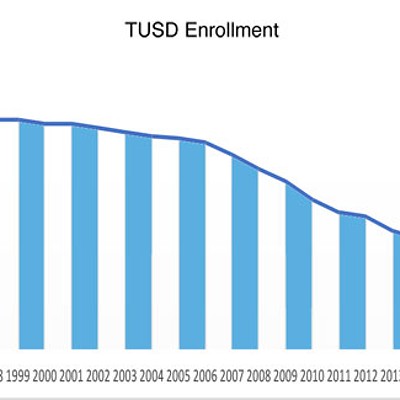When the Arizona Legislature wrapped up its work on Thursday, May 3, it concluded one of the most conservative sessions in the state's history.
GOP lawmakers—who held a two-thirds majority in both the Senate and the House of Representatives—created new barriers to abortion services, including a push to deny funding to Planned Parenthood, even for non-abortion-related health services for low-income women. They pushed through new tax cuts for Arizona's wealthiest residents. They created a new shield of secrecy for companies that pollute. They eliminated job protections for state employees. They agreed to spend more on private prisons. And they approved the use of automatic weapons and armor-piercing ammo for hunters.
Here are some of the highlights (or lowlights, depending on your point of view) of the session. The majority of the new laws will take effect in August.
Women's Health
It was another rough session for Planned Parenthood, which has already been forced to stop offering abortion services outside of Pima and Maricopa counties because of recently passed laws that restrict the use of medication-induced abortions.
• This year, Republican lawmakers pushed through legislation that further restricted access to abortion in Arizona. One law blocked abortion after 20 weeks of pregnancy—and redefined pregnancy as occurring at the start of a woman's last menstrual period, effectively defining life as beginning before conception.
Critics of the legislation argue that it will give the mother little time to consider abortion if prenatal testing shows potential birth defects.
• A new law will relieve doctors of any civil liability for withholding information about potential birth defects during a pregnancy.
• Last week, Gov. Jan Brewer signed a bill that bans Planned Parenthood and any other health-care organizations that provide abortions from receiving any federal funds that pass through the state, including Medicaid funding for low-income Arizonans, and money from family-planning programs.
If the law survives an anticipated legal challenge, it will mean that Planned Parenthood can no longer provide low-cost cancer screenings, pap smears, STD treatments, contraceptive options and other health-care services to low-income women who are on the state's AHCCCS program.
"The impact will be felt hardest by women who choose Planned Parenthood for their care," says Michelle Steinberg, a spokeswoman for the organization. "They will not be able to choose their health-care provider."
• Brewer signed into law a bill that prevents Planned Parenthood from qualifying as an eligible nonprofit under a state law that allows taxpayers to receive up to $200 in tax credits if they give money to organizations that help the working poor.
Lawmakers passed similar legislation last year, but a federal court blocked its implementation because the law said that no organization that even referred women to abortion providers could qualify as an eligible nonprofit. Federal Judge Roslyn Silver ruled that the provision restricts the free speech of workers at domestic-violence shelters and other nonprofits.
This year's version was stripped of the provision.
• Finally, lawmakers also passed a bill that would allow "religiously affiliated employers" to refuse to provide health-care coverage for contraceptives. Brewer signed the bill on Friday, May 11.
Critics of the proposed law say it doesn't include a definition of a "religiously affiliated employer," so any company that gives a percentage of its profits to a church could consider itself "religiously affiliated."
The law also eliminates language in state law that prohibits employers from firing women for using contraception, even if the women pay for the birth control themselves. And the new law doesn't require employers to disclose to new hires that they don't offer contraceptives coverage.
"The people who are making it as difficult as possible to access abortion services—who want to stop abortions, period—are the same people who want to restrict access to family planning," Steinberg says. "If you reduce access to family planning, you're going to have more abortions. And more STDs, for that matter."
Education
Schools got a slight boost in the state's $8.57 billion budget, with lawmakers adding $40 million as part of an initiative to help third-graders meet reading requirements. (See "Penny-Pinchers, Currents, May 10.) They also boosted spending on "soft capital"—books, computers, desks and the like—by $15 million, and agreed to set aside $12 million for emergency school repairs, although there is no money in the budget for new school construction.
• Schools will be able to offer electives in Bible study, thanks to Rep. Terri Proud's bill to allow students to learn about the "history and literature" of the Old and New Testaments.
• Two other bills aimed at schools did not make it through the Legislature. One would have banned teachers from using any language in the classroom that has been deemed unsuitable for broadcast by the Federal Communications Commission, and the other would have banned teachers from using "partisan" speech in their lessons.
• On the higher-education front, the university system will receive a $21 million spending boost, but the UA will lose its current advantage over Arizona State University and Northern Arizona University under a new funding formula.
• The UA Medical School's Phoenix campus will get a boost of $6 million.
• University students will be protected from the dreaded threat of medical marijuana. A new law makes it illegal to possess weed on campus, even if a person has a prescription for it.















